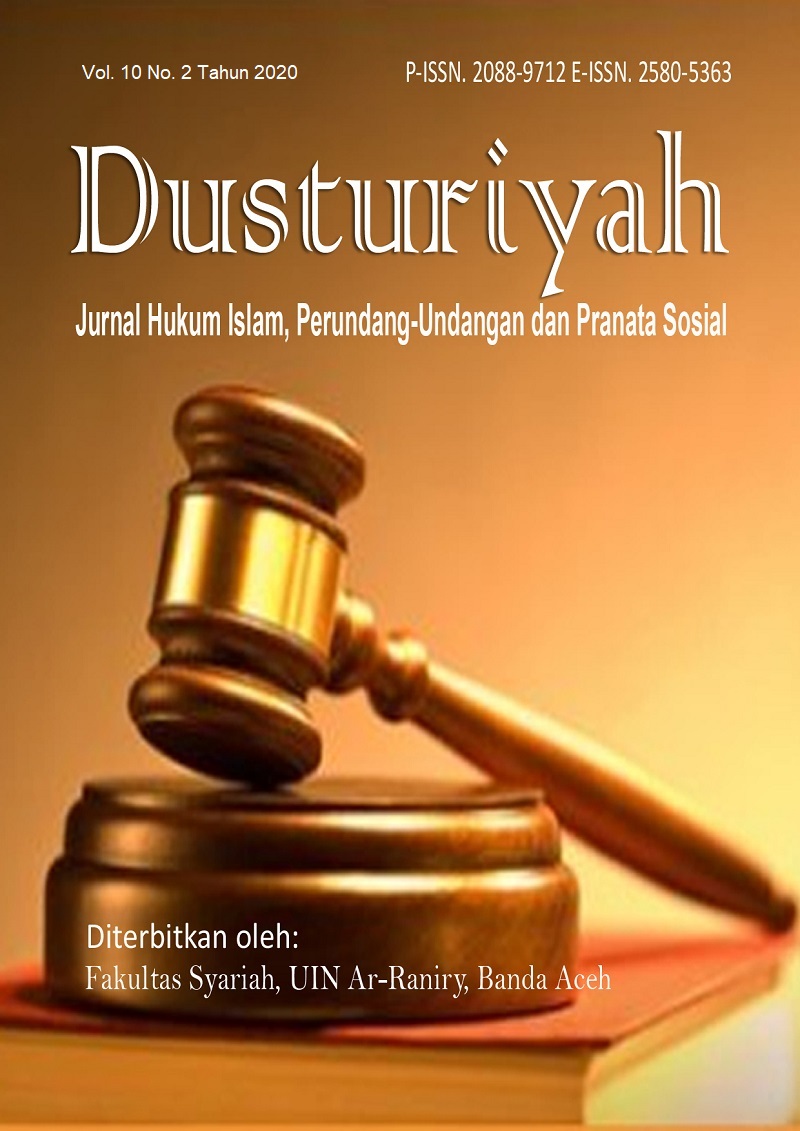ANALYSIS OF ISLAMIC CRIMINAL LAW ON THE USE OF CCTV VIDEO RECORDING TOOLS (Decision Study Number 465 / Pid.B / 2019 / PN Smg)
DOI:
https://doi.org/10.22373/dusturiyah.v10i2.8117Keywords:
CCTV Video Recording, qarīnah, Islamic Law.Abstract
Discussion of CCTV video recordings that serve as a monitoring tool to record all events. The existence of this tool is very useful as a source of information in case of a criminal act. Therefore, in this technological era, these video recordings then began to enter the realm of law, this video recording is very useful as a source of information in the event of a criminal act. It is not uncommon for these video recordings to be used as evidence in a trial, but the problem is that this video recording is not included in Article 184 of the Criminal Procedure Code regarding various types of evidence, is not included in Islamic law, and also this video recording is very important. very vulnerable to being manipulated for certain purposes and purposes, therefore it is interesting for the author to research it, so the question arises how to use CCTV video evidence in trials of premeditated murder in Decision Number 465 / Pid.B / 2019 / PN Smg ?, how analysis of Islamic criminal law on the use of CCTV video evidence in the trial of premeditated murder in Decision Number 465 / Pid.B / 2019 / PN Smg? The method that I use in this journal is the library research method. The results of this study The use of CCTV video evidence in Decision Number 465 / Pid.B / 2019 / PN Smg can be used as legal evidence and in its use it is used as evidence for guidance by the judge supported by the testimonies of witnesses and statements from the an expert, in which the witnesses and experts have been sworn in to give true testimony at trial, so as to convince the judge of the truth of a criminal act committed by the defendant. The use of CCTV video recordings in Decision Number 465 / Pid.B / 2019 / PN Smg can be used as evidence of guidance or qarīnah which corroborates other evidence. The use of CCTV video evidence evidence in Islamic criminal law is included in the category of bayyinah which means anything that can show the truth of an event or action, in its use it is included in Qarīnah evidence.References
Abd. Rahman Dahlan.Ushul Fiqh. Jakarta: Amzah, 2014.
Abdul Qadir Audah. At-Tasyri’ al-Jina’i al-Islami: muqoronan bil qanun al-Wadl’i Beirut: Darul Katib Al-A’araby, t.t.
Abdul Aziz Dahlan. Esinklopedi Hukum Islam. Jakarta: Ichtiar Baru Van Hoeve, 1996.
Abdul Qadir Audah, At-Tasyri’ al-Jina’I al-Islami: muqoronan bil qanun al-Wadl’i. Beirut: Darul Katib Al-A’araby, t.t.
Ahmad Fathi Bahansyi. Teori Pembuktian Menurut Fiqih Jinyah Islam, Terj. Usman Hasyim & Ibnu Rachman. Yogyakarta: Andi Offset, 1984.
Anang Priyanto. Hukum Acara Pidana Indonesia. Yogyakarta: tnp., 2012.
Andi Hamzah. Hukum Acara Pidana di Indonesia. Jakarta:Sinar Grafika, 2013.
Anshoruddin. Hukum Pembuktian Menurut Hukum Acara Islam dan Hukum Positif. Yogyakarta: Pustaka Pelajar, 2004.
Arief S. Sadiman. Media Pendidikan. Jakarta: Raja Grafindo Persada, 2009.
Asadulloh Al-Faruq. Hukum Acara Peradilan Islam. Yogyakarta: Pustaka Yustika, 2009.
Bambang Waluyo. Penelitian Hukum dalam Praktek. Jakarta: Sinar Grafika, 2002.
Bagong Susyanto, Satinah. Metode Penelitian Sosial: Dasar Metode. Teknik. Bandung: Pustaka Setia, 1994.
Departemen Agama. Kompilasi Hukum Acara menurut Syariat Islam. Jakarta: Pembinaan Badan Peradilan Agama, 1985.
DEPDIKBUD, Kamus Bahasa Indonesia. Jakarta: Balai Pustaka, 1995.
Direktori Putusan Pengadilan Negeri Banda Aceh (No. 72/Pid.B/2018/PN Bna).
Djoko Prakoso. Alat Bukti dan Kekuatan Pembuktian Dalam Proses Pidana. Yogyakarta: Liberty Offset, 1988.
Eddy O.S. Hiariej. Teori dan Hukum Pembuktian. Jakarta: Erlangga, 2012.
Etta Mamang Sangadji, Sopiah. Metodologi Penelitian Pendekatan Praktis dalam Penelitian. Yogyakarta: Andi Offset, 2010.
Hasbi Ash Shiddieqy, T.M. Peradilan dan Hukum Acara Islam. Semarang: Pustaka Rizki Putra, 1997.











